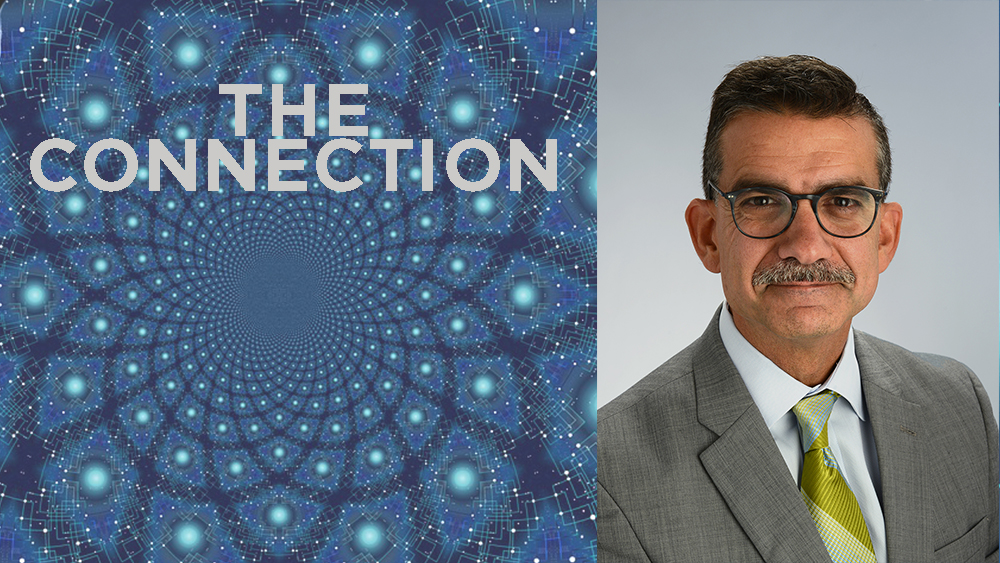
Medicine is multi-dimensional, but the pandemic has brought two important areas, research and practice, to the forefront in an unprecedented way. For Dr. Mario Castro, Vice Chair for Clinical Research at KU Medical Center (KUMC) and Division Chief of Pulmonary, Critical Care and Sleep Medicine, the challenge of both areas is a daily effort in a normal year but a unique test in the COVID-19 era.
Beyond his primary roles at KUMC, Castro is also the Director of the Frontiers: University of Kansas Clinical and Translational Science Institute. With multiple titles and roles, Castro has a unique seat at the table of both research and clinical practice. The purpose of Frontiers is to provide the infrastructure to integrate the two areas, resulting in the translational implementation of research to improve healthcare.
The Frontiers mission can be a challenge due to the geography involved, spanning all of Kansas and Western Missouri. “We address the needs of the underserved and overlooked populations in the community, but one of the challenges of rural medicine is how do you reach out to a patient that is eight hours away,” Castro said. This has influenced the way Frontiers has been built, establishing networks of primary care providers and collaborators within the distinct geographic locations. Having a centralized group provides a collaborative environment that would otherwise be impossible to connect.
Castro leads a research group at KUMC that focuses on understanding severe asthma and developing preventative approaches and therapies. The team uses imaging modalities, like CT and MRI scans, to visualize the disease’s impact on the lungs and to drive their treatments.
Castro’s impact on the treatment of severe asthma cannot be understated. While the single historical treatment has been the use of inhalers, Castro worked with a startup company in California called AsthmaTX to develop Bronchial Thermoplasty, now owned and licensed by Boston Scientific. This treatment uses an application of heat and thermal energy to the airways, causing the muscle around the trachea to decrease in size. What started as a translational application of an alternative to previous asthma treatments has now helped over 10,000 patients worldwide. “I just treated a patient from Southwest Missouri that drove 5 hours to get here, but after three treatments the asthma is so controlled that she is no longer having to go to the emergency room, no longer needing to be on steroids, and it’s made such a huge impact on her quality of life,” Castro said.
The spread and impact of COVID-19 immediately caused Castro’s team to refocus on both the real time health care demands of the at-risk in the Kansas City area and to perform research to identify effective vaccines and treatment options, especially for his asthma patients. Castro’s early research while treating COVID-19 patients revealed a propensity towards long-term lung damage. “Patients I am seeing, are months out from their initial infection and they are still in the recovery phase. In order to get ahead of this infection, we need to treat it in early in the disease process before it gets too severe. Our current studies are using monoclonal antibodies against COVID-19 to treat it in the milder stages.” Castro said. The Frontiers program awarded three pilot awards in the summer of 2020 to support and encourage translational COVID-19 research.
Castro immigrated to Kansas City over 50 years ago from Cuba. He doesn’t take his opportunities for granted. “The community really supported us, supported my parents learning English and getting jobs,” Castro said. His father worked three jobs to support his family, starting over in a new place. Castro seized the opportunity to go to Rockhurst High School and was stimulated by science and biology. He was accepted to the University of Missouri – Kansas City (UMKC) School of Medicine at 17 and was introduced to medical practice early on. He worked for Mayo Clinic and then Washington University in St Louis for 25 years before returning to Kansas City to foster research in the KC region and be closer to family.
Castro’s career has been dedicated to both research and practice, and he is determined to bridge the gap for patients, especially during a global pandemic. His creativity and adaptability combined with the connection of resources will help improve outcomes. “We can enlist the leaders in the region from our Frontier partners at KUMC, Children’s Mercy, UMKC and Saint Luke’s to work on problems together. It is exciting to tackle these immediate needs for the COVID-19 pandemic and to set the stage to expand clinical and translational research for the future,” Castro said. With effective execution of these goals, we can make a big difference in transforming lives and supporting our community amid a once in a lifetime pandemic.